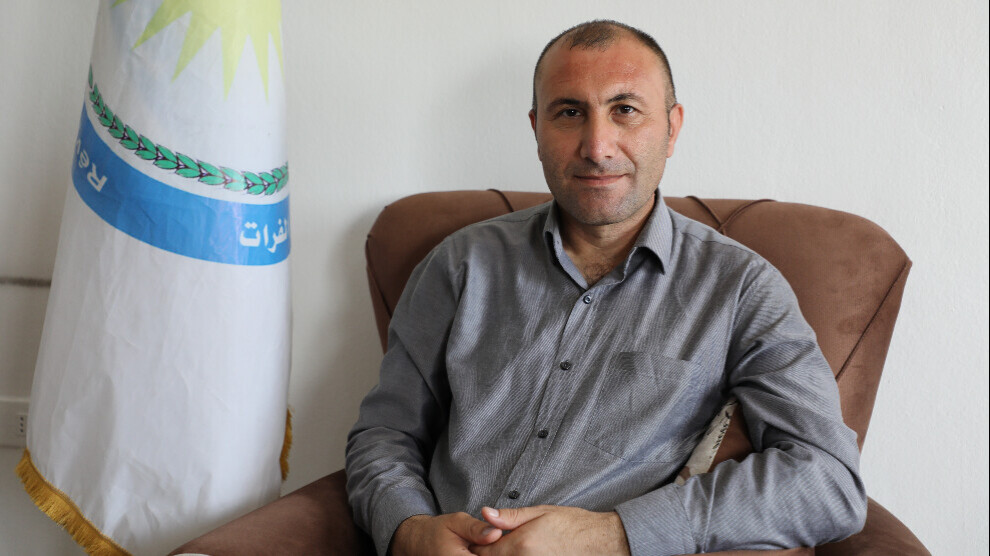Mihemed Şahin: Turkish state's Syria policy has failed
Mihemed Şahin, co-chair of the Executive Council of the Euphrates Region, said that the Turkish state's Syria policy was a failure and that Turkey attacked Northern and Eastern Syria to hide it.
Mihemed Şahin, co-chair of the Executive Council of the Euphrates Region, said that the Turkish state's Syria policy was a failure and that Turkey attacked Northern and Eastern Syria to hide it.

Fırat Region Executive Council co-chair Mihemed Şahin tol ANF that the main goal of the Turkish state is the liquidation of the Northern and Eastern Syria Autonomous Administration and added: "To achieve this, Turkey would establish a dialogue with the Damascus administration, talks with it and eventually give up its mercenary allies."
On the one hand, the Turkish state continues its attacks on Northern and Eastern Syria, while on the other, it mentions possible talks with the Damascus administration. What is the Turkish state trying to do?
We can see that the Turkish state's military and political attitude has changed in recent days. Turkey played a major role in the deepening of the Syrian crisis for 11 years. Indeed, it continues its efforts to occupy new territories in Northern and Eastern Syria. When it can't get the support it wants, it follows a different attack strategy. It has increased its attacks with drones, accompanied by land bombardment. Of course, the US and Russia remain silent on this. Politically, as a result of forming and feeding the mercenary groups in Syria, the goal of creating a regime loyal to itself failed. In fact, this means the failure of Turkish policy in the Middle East and Syria. For this reason, it is trying a different policy. It wants to improve relations with the Damascus administration.
The Turkish state talks about dialogue with the Damascus administration, but at the same time it targets its military bases. Only recently, soldiers of the Syrian army were killed in an attack in Kobanê. How do you explain this?
When the Turkish state wants to make some political and diplomatic alliances, it tries to show itself as the strongest party. In this way, it tries to show that the alliances it will make are not due to weakness or an attempt to break a deadlock. This is the Turkish state style. That's why, while trying to have a dialogue with the Damascus administration, it tries to show that it is standing and strong by attacking from time to time. Of course, everyone sees this attitude now. The Turkish state's Ottoman dream, occupation and annexation policy has been lost. The Turkish state is now experiencing major economic, social and political crises within Turkey. It is weak. For this reason, it is trying to get rid of the mercenaries at its command by meeting with the Damascus government.
What role does Russia play in this?
From the very beginning, Russia intervened by taking the side of the Damascus administration. It sees the Damascus administration as its strategic ally. For this reason, it wants to ensure the re-establishment of the regime's authority throughout Syria. The dialogue between the Turkish state and the Damascus administration is also being prompted with the encouragement of Russia. Let’s be clear: Russia supports this effort. It appears that the Turkish state is abandoning the gangs to normalize its relations with the Damascus government. And in return, there are concessions on the issue of attacking Northern and Eastern Syria. Russia's attitude confirms this.
The Adana Agreement of 1998 is repeatedly mentioned in the current debate. With this agreement, Turkey was granted freedom of operation in an area up to five kilometers behind the border. Now there is talk of a thirty-kilometer-deep "security zone" on Syrian territory along the border. What do you think?
The Adana Agreement was political and directed against the Kurds. This agreement is now to be updated to liquidate the Autonomous Administration of Northeast Syria. In order to gain the approval of the government in Damascus, the Turkish government is ready to open a dialogue with Damascus, negotiate and abandon the gangs it supports.